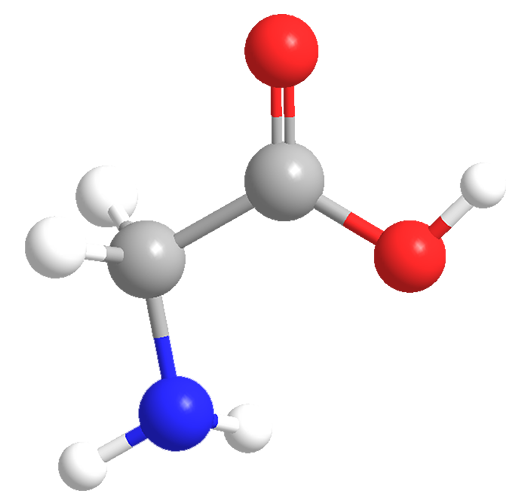What molecule am I?


Glycine is the smallest possible of the 20 amino acids that are essential for human life. In a seeming contradiction, glycine is called a “nonessential” amino acid because it can be synthesized by the body and therefore does not have to be included in the diet. It is the only achiral amino acid in that the carbon atom bearing the carboxylate and amino groups is not a stereogenic center.
In 1924, Hilda Louise Kingston and Samuel Barnett Schryver at the Imperial College of Science and Technology (London) isolated glycine from the hydrolysis products of gelatin. The following year, two laboratory syntheses of glycine were published in Organic Syntheses. In the subsequent 30 years, additional biological sources were identified and lab syntheses developed.
Just this year, humble glycine made a big splash in the news. Scientists at the NASA Goddard Space Center (Greenbelt, MD) found glycine in particles of the comet Wild 2 that were returned to Earth by the Stardust spacecraft. This finding confirms some scientists’ belief that biological building blocks may have come to Earth from space, but because the molecule was glycine, the origin of chirality is still murky.
MOTW update:
November 5, 2018
L-Alanine and L-serine were the Molecules of the Week for October 29, 2018. They, along with glycine and L-proline, are the chief amino acids that make up spider silk proteins. In the past month, chemists at San Diego State University and Northwestern University (Evanston, IL) discovered that before spiders spin their silk, they store the silk proteins in complex nanoparticles.

Learn more about this molecule from CAS, the most authoritative and comprehensive source for chemical information.
Molecule of the Week needs your suggestions!
If your favorite molecule is not in our archive, please send us a message. The molecule can be notable for its current or historical importance or for any quirky reason. Thank you!
Stay Ahead of the Chemistry Curve
Learn how ACS can help you stay ahead in the world of chemistry.

